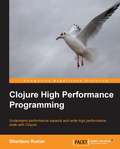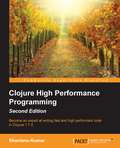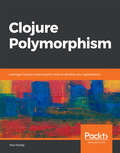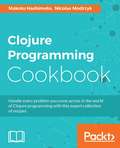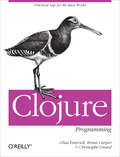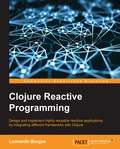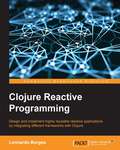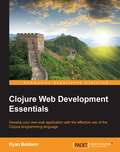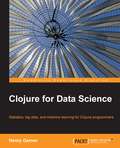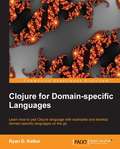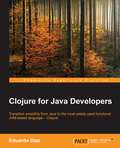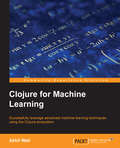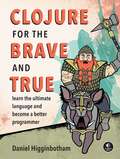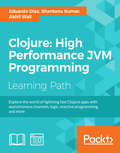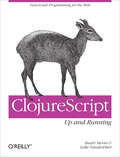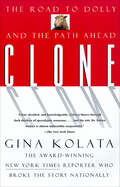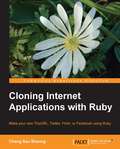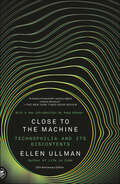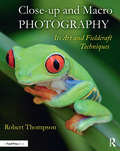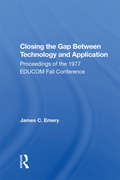- Table View
- List View
Clojure High Performance Programming
by Shantanu KumarThis is a short, practical guide that will teach you everything you need to know to start writing high performance Clojure code.This book is ideal for intermediate Clojure developers who are looking to get a good grip on how to achieve optimum performance. You should already have some experience with Clojure and it would help if you already know a little bit of Java. Knowledge of performance analysis and engineering is not required. For hands-on practice, you should have access to Clojure REPL with Leiningen.
Clojure High Performance Programming - Second Edition
by Shantanu KumarBecome an expert at writing fast and high performant code in Clojure 1.7.0 About This Book * Enhance code performance by using appropriate Clojure features * Improve the efficiency of applications and plan their deployment * A hands-on guide to designing Clojure programs to get the best performance Who This Book Is For This book is intended for intermediate Clojure developers who are looking to get a good grip on achieving optimum performance. Having a basic knowledge of Java would be helpful. What You Will Learn * Identify performance issues in Clojure programs using different profiling tools * Master techniques to achieve numerical performance in Clojure * Use Criterium library to measure latency of Clojure expressions * Exploit Java features in Clojure code to enhance performance * Avoid reflection and boxing with type hints * Understand Clojure's concurrency and state-management primitives in depth * Measure and monitor performance, and understand optimization techniques In Detail Clojure treats code as data and has a macro system. It focuses on programming with immutable values and explicit progression-of-time constructs, which are intended to facilitate the development of more robust programs, particularly multithreaded ones. It is built with performance, pragmatism, and simplicity in mind. Like most general purpose languages, various Clojure features have different performance characteristics that one should know in order to write high performance code. This book shows you how to evaluate the performance implications of various Clojure abstractions, discover their underpinnings, and apply the right approach for optimum performance in real-world programs. It starts by helping you classify various use cases and the need for them with respect to performance and analysis of various performance aspects. You will also learn the performance vocabulary that experts use throughout the world and discover various Clojure data structures, abstractions, and their performance characteristics. Further, the book will guide you through enhancing performance by using Java interoperability and JVM-specific features from Clojure. It also highlights the importance of using the right concurrent data structure and Java concurrency abstractions. This book also sheds light on performance metrics for measuring, how to measure, and how to visualize and monitor the collected data. At the end of the book, you will learn to run a performance profiler, identify bottlenecks, tune performance, and refactor code to get a better performance. Style and approach An easy-to-follow guide full of real-world examples and self-sufficient code snippets that will help you get your hands dirty with high performance programming with Clojure.
Clojure Polymorphism: Leverage Clojure's polymorphic tools to develop your applications
by Paul StadigLearn when and how to use Clojure's polymorphic features to develop efficient multithreaded applications Key Features Get to grips with the different polymorphic tools that Clojure offers Develop a taste for good Clojure designs through various engaging examples Study various design principles and learn ways to use them in your applications Book Description Clojure is a modern, dynamic language that you can use to develop robust, multithreaded programs. Clojure Polymorphism is a comprehensive guide that shows you how to use Clojure's features to your advantage. The book begins by describing examples that show how to define and implement abstractions with plain functions and multimethods. Then you'll analyze these examples and separate the good and bad aspects of their design principles. You'll also learn how to perform data transformation abstraction with a plain function and discover how to write new cross-platform predicates while keeping the core of your abstraction free from reader conditionals. The later chapters explain the considerations to keep in mind when implementing Clojure protocols on the Java Virtual Machine (JVM). By the end of this book, you'll know how to use the various polymorphic tools of Clojure to your advantage while designing your applications. What you will learn Explore how polymorphism is implemented in Clojure Discover what design principles to use when creating and implementing abstractions Explore different ways to implement protocols in Clojure Implement various design principles while working with the JVM Write and compare plain functions and multimethods for transforming data Analyze functions and abstractions for their performance and flexibility Learn about common “gotchas” to avoid errors when writing code Who this book is for Clojure Polymorphism is useful for all programmers who want to leverage Clojure's polymorphic tools to build efficient applications. To get the most out of this book, you must be a moderately proficient Clojure programmer.
Clojure Programming Cookbook
by Nicolas Modrzyk Makoto HashimotoHandle every problem you come across in the world of Clojure programming with this expert collection of recipes About This Book * Discover a wide variety of practical cases and real world techniques to enhance your productivity with Clojure. * Learn to resolve the everyday issues you face with a functional mindset using Clojure * You will learn to write highly efficient, more productive, and error-free programs without the risk of deadlocks and race-conditions Who This Book Is For This book is for Clojure developers who have some Clojure programming experience and are well aware of their shortcomings. If you want to learn to tackle common problems, become an expert, and develop a solid skill set, then this book is for you. What You Will Learn * Manipulate, access, filter, and transform your data with Clojure * Write efficient parallelized code through Clojure abstractions * Tackle Complex Concurrency easily with Reactive Programming * Build on Haskell abstractions to write dynamic functional tests * Write AWS Lambda functions effortlessly * Put Clojure in use into your IoT devices * Use Clojure with Slack for instant monitoring * Scaling your Clojure application using Docker * Develop real-time system interactions using MQTT and websockets In Detail When it comes to learning and using a new language you need an effective guide to be by your side when things get rough. For Clojure developers, these recipes have everything you need to take on everything this language offers. This book is divided into three high impact sections. The first section gives you an introduction to live programming and best practices. We show you how to interact with your connections by manipulating, transforming, and merging collections. You'll learn how to work with macros, protocols, multi-methods, and transducers. We'll also teach you how to work with languages such as Java, and Scala. The next section deals with intermediate-level content and enhances your Clojure skills, here we'll teach you concurrency programming with Clojure for high performance. We will provide you with advanced best practices, tips on Clojure programming, and show you how to work with Clojure while developing applications. In the final section you will learn how to test, deploy and analyze websocket behavior when your app is deployed in the cloud. Finally, we will take you through DevOps. Developing with Clojure has never been easier with these recipes by your side! Style and approach This book takes a recipe-based approach by diving directly into helpful programming concepts. It will give you a foolproof approach to programming and teach you how to deal with problems that may arise while working with Clojure. The book is divided into three sections giving you the freedom skip to the section of your choice depending on the problem faced.
Clojure Programming: Practical Lisp for the Java World (O'reilly Ser.)
by Chas Emerick Brian Carper Christophe GrandClojure is a practical, general-purpose language that offers expressivity rivaling other dynamic languages like Ruby and Python, while seamlessly taking advantage of Java libraries, services, and all of the resources of the JVM ecosystem. This book helps you learn the fundamentals of Clojure with examples relating it to the languages you know already, in the domains and topics you work with every day. See how this JVM language can help eliminate unnecessary complexity from your programming practice and open up new options for solving the most challenging problems. Clojure Programming demonstrates the language’s flexibility by showing how it can be used for common tasks like web programming and working with databases, up through more demanding applications that require safe, effective concurrency and parallelism, data analysis, and more. This in-depth look helps tie together the full Clojure development experience, from how to organize your project and an introduction to Clojure build tooling, to a tutorial on how to make the most of Clojure’s REPL during development, and how to deploy your finished application in a cloud environment.Learn how to use Clojure while leveraging your investment in the Java platformUnderstand the advantages of Clojure as an efficient Lisp for the JVMSee how Clojure is used today in several practical domainsDiscover how Clojure eliminates the need for many verbose and complicated design patternsDeploy large or small web applications to the cloud with Clojure
Clojure Reactive Programming
by Leonardo BorgesIf you are a Clojure developer who is interested in using Reactive Programming to build asynchronous and concurrent applications, this book is for you. Knowledge of Clojure and Leiningen is required. Basic understanding of ClojureScript will be helpful for the web chapters, although it is not strictly necessary.
Clojure Reactive Programming
by Leonardo Borges<P><P>Key Features <P><P>Learn how to leverage the features of functional reactive programming using Clojure <P><P>Create dataflow-based systems that are the building blocks of reactive programming <P><P>Learn different Functional Reactive Programming frameworks and techniques by implementing real-world examples <P><P>Book Description <P><P>Reactive Programming (RP) is central to many concurrent systems. It endeavors to make the process of developing highly-concurrent, event-driven, and asynchronous applications simpler and less error-prone. RP comes in many flavors and we will look at some of them in this book. <P><P>Clojure Reactive Programming is a practical guide aimed at exploring RP. It starts by describing Functional Reactive Programming (FRP) and its formulations, as well as how it inspired Compositional Event Systems (CES). <P><P>It also presents several examples of Reactive applications implemented in different frameworks, allowing you to develop an understanding of the subject as well as learn how to develop your ability to work with time-varying values. By the end of the book, you will be equipped to solve real-world problems and have a clear understanding of when and how you should use different the approaches that are shown in the book. <P><P>What you will learn <P><P>Understand the key abstractions of Functional Reactive Programming (FRP) and Compositional Event Systems (CES) <P><P>Discover how to think in terms of time-varying values and event streams <P><P>Create, compose, and transform Observable sequences with Reactive Extensions <P><P>Create a CES framework from scratch using core.async as its foundation <P><P>Build a simple ClojureScript game using Reagi <P><P>Integrate Om and RxJS in a web application <P><P>Implement a reactive API to Amazon Web Services <P><P>Discover approaches to backpressure and error handling <P><P>Get to grips with futures and learn where they fit in
Clojure Web Development Essentials
by Ryan BaldwinThis book is for anyone who's worked with Clojure and wants to use it to start developing applications for the Web. Experience or familiarity with basic Clojure syntax is a must, and exposure to Leiningen (or other similar build tools such as Maven) would be helpful.
Clojure for Data Science
by Henry GarnerStatistics, big data, and machine learning for Clojure programmers About This Book * Write code using Clojure to harness the power of your data * Discover the libraries and frameworks that will help you succeed * A practical guide to understanding how the Clojure programming language can be used to derive insights from data Who This Book Is For This book is aimed at developers who are already productive in Clojure but who are overwhelmed by the breadth and depth of understanding required to be effective in the field of data science. Whether you're tasked with delivering a specific analytics project or simply suspect that you could be deriving more value from your data, this book will inspire you with the opportunities-and inform you of the risks-that exist in data of all shapes and sizes. What You Will Learn * Perform hypothesis testing and understand feature selection and statistical significance to interpret your results with confidence * Implement the core machine learning techniques of regression, classification, clustering and recommendation * Understand the importance of the value of simple statistics and distributions in exploratory data analysis * Scale algorithms to web-sized datasets efficiently using distributed programming models on Hadoop and Spark * Apply suitable analytic approaches for text, graph, and time series data * Interpret the terminology that you will encounter in technical papers * Import libraries from other JVM languages such as Java and Scala * Communicate your findings clearly and convincingly to nontechnical colleagues In Detail The term "data science" has been widely used to define this new profession that is expected to interpret vast datasets and translate them to improved decision-making and performance. Clojure is a powerful language that combines the interactivity of a scripting language with the speed of a compiled language. Together with its rich ecosystem of native libraries and an extremely simple and consistent functional approach to data manipulation, which maps closely to mathematical formula, it is an ideal, practical, and flexible language to meet a data scientist's diverse needs. Taking you on a journey from simple summary statistics to sophisticated machine learning algorithms, this book shows how the Clojure programming language can be used to derive insights from data. Data scientists often forge a novel path, and you'll see how to make use of Clojure's Java interoperability capabilities to access libraries such as Mahout and Mllib for which Clojure wrappers don't yet exist. Even seasoned Clojure developers will develop a deeper appreciation for their language's flexibility! You'll learn how to apply statistical thinking to your own data and use Clojure to explore, analyze, and visualize it in a technically and statistically robust way. You can also use Incanter for local data processing and ClojureScript to present interactive visualisations and understand how distributed platforms such as Hadoop sand Spark's MapReduce and GraphX's BSP solve the challenges of data analysis at scale, and how to explain algorithms using those programming models. Above all, by following the explanations in this book, you'll learn not just how to be effective using the current state-of-the-art methods in data science, but why such methods work so that you can continue to be productive as the field evolves into the future. Style and approach This is a practical guide to data science that teaches theory by example through the libraries and frameworks accessible from the Clojure programming language.
Clojure for Domain-specific Languages
by Ryan D. KelkerAn example-oriented approach to develop custom domain-specific languages. If you've already developed a few Clojure applications and wish to expand your knowledge on Clojure or domain-specific languages in general, then this book is for you. If you're an absolute Clojure beginner, then you may only find the detailed examples of the core Clojure components of value. If you've developed DSLs in other languages, this Lisp and Java-based book might surprise you with the power of Clojure.
Clojure for Finance
by Timothy WashingtonIf you're a finance professional who is currently using VBA (Excel) to perform financial calculations and quantitative analysis, and would like to use Clojure instead to improve their efficiency, then this book is for you. Basic knowledge of financial concepts is essential. Basic programming knowledge would also be an added advantage.
Clojure for Java Developers
by Eduardo DiazTransition smoothly from Java to the most widely used functional JVM-based language - Clojure About This Book * Write apps for the multithreaded world with Clojure's flavor of functional programming * Discover Clojure's features and advantages and use them in your existing projects * The book is designed so that you'll be able put to use your existing skills and software knowledge to become a more effective Clojure developer Who This Book Is For This book is intended for Java developers, who are looking for a way to expand their skills and understand new paradigms of programming. Whether you know a little bit about functional languages, or you are just getting started, this book will get you up and running with how to use your existing skills in Clojure and functional programming. What You Will Learn * Understand the tools for the Clojure world and how they relate to Java tools and standards (like Maven) * Learn about immutable data structures, and what makes them feasible for everyday programming * Write simple multi-core programs using Clojure's core concepts, like atoms, agents and refs * Understand that in Clojure, code is data, and how to take advantage of that fact by generating and manipulating code with macros * Learn how Clojure interacts with Java, how the class loaders work and how to use Clojure from Java or the other way around * Discover a new, more flexible meaning of polymorphism and understand that OOP is not the only way to get it In Detail We have reached a point where machines are not getting much faster, software projects need to be delivered quickly, and high quality in software is more demanding as ever. We need to explore new ways of writing software that helps achieve those goals. Clojure offers a new possibility of writing high quality, multi-core software faster than ever, without having to leave your current platform. Clojure for Java developers aims at unleashing the true potential of the Clojure language to use it in your projects. The book begins with the installation and setup of the Clojure environment before moving on to explore the language in-depth. Get acquainted with its various features such as functional programming, concurrency, etc. with the help of example projects. Additionally, you will also, learn how the tooling works, and how it interacts with the Java environment. By the end of this book, you will have a firm grip on Clojure and its features, and use them effectively to write more robust programs. Style and approach An easy to follow, step-by-step, guide on how to start writing Clojure programs making use of all of its varied features and advantages. As this is a new language, certain new concepts are supported with theoretical section followed by simple projects to help you gain a better understanding and practice of how Clojure works.
Clojure for Machine Learning
by Akhil WaliA book that brings out the strengths of Clojure programming that have to facilitate machine learning. Each topic is described in substantial detail, and examples and libraries in Clojure are also demonstrated. This book is intended for Clojure developers who want to explore the area of machine learning. Basic understanding of the Clojure programming language is required, but thorough acquaintance with the standard Clojure library or any libraries are not required. Familiarity with theoretical concepts and notation of mathematics and statistics would be an added advantage.
Clojure for the Brave and True: Learn the Ultimate Language and Become a Better Programmer
by Daniel HigginbothamFor weeks, months—nay!—from the very moment you were born, you’ve felt it calling to you. At long last you’ll be united with the programming language you’ve been longing for: Clojure!As a Lisp-style functional programming language, Clojure lets you write robust and elegant code, and because it runs on the Java Virtual Machine, you can take advantage of the vast Java ecosystem. Clojure for the Brave and True offers a "dessert-first" approach: you’ll start playing with real programs immediately, as you steadily acclimate to the abstract but powerful features of Lisp and functional programming. Inside you’ll find an offbeat, practical guide to Clojure, filled with quirky sample programs that catch cheese thieves and track glittery vampires.Learn how to:–Wield Clojure’s core functions–Use Emacs for Clojure development–Write macros to modify Clojure itself–Use Clojure’s tools to simplify concurrency and parallel programmingClojure for the Brave and True assumes no prior experience with Clojure, the Java Virtual Machine, or functional programming. Are you ready, brave reader, to meet your true destiny? Grab your best pair of parentheses—you’re about to embark on an epic journey into the world of Clojure!
Clojure in Action
by Amit RathoreSummaryA fully revised edition that covers the new features available in Clojure 1.6.Purchase of the print book includes a free eBook in PDF, Kindle, and ePub formats from Manning Publications.About the TechnologyClojure is a modern Lisp for the JVM. It has the strengths you expect: first-class functions, macros, and Lisp's clean programming style. It supports functional programming, making it ideal for concurrent programming and for creating domain-specific languages. Clojure lets you solve harder problems, make faster changes, and end up with a smaller code base. It's no wonder that there are so many Clojure success stories.About the BookClojure in Action, Second Edition is an expanded and improved version that's been updated to cover the new features of Clojure 1.6. The book gives you a rapid introduction to the Clojure language, moving from abstract theory to practical examples. You'll start by learning how to use Clojure as a general-purpose language. Next, you'll explore Clojure's efficient concurrency model, based on the database concept of Software Transactional Memory (STM). You'll gain a new level of productivity through Clojure DSLs that can run on the JVM. Along the way, you'll learn countless tips, tricks, and techniques for writing smaller, safer, and faster code.What's InsideFunctional programming basicsMetaprogramming with Clojure's macrosInteroperating with JavaCovers Clojure 1.6About the ReaderAssumes readers are familiar with a programming language like C, Java, Ruby, or Python.Table of ContentsIntroducing ClojureClojure elements: Data structures and functionsBuilding blocks of ClojureMultimethod polymorphismExploring Clojure and Java interopState and the concurrent worldEvolving Clojure through macrosMore on functional programmingProtocols, records, and typesTest-driven development and moreMore macros and DSL
Clojure: High Performance JVM Programming
by Shantanu Kumar Akhil Wali Eduardo DiazExplore the world of lightning fast Clojure apps with asynchronous channels, logic, reactive programming, and more About This Book • Discover Clojure's features and advantages and use them in your existing projects • Explore lesser-known and more advanced features, constructs, and methodologies such as asynchronous channels, actors, logic programming, and reactive programming • Measure and monitor performance, and understand optimization techniques Who This Book Is For If you're looking to learn more about its core libraries and delve into the Clojure language in detail, then this book is ideal for you. Prior knowledge of the Clojure language is required. What You Will Learn • Understand tools for the Clojure world and how they relate to Java tools and standards (such as Maven) • Write simple multicore programs using Clojure's core concepts, such as atoms, agents, and refs • Get to grips with Clojure's concurrency and state-management primitives in depth • Analyze latency using the Criterium library • Avoid reflection and boxing with type hints • Maximize the impact of parallelization, functional composition, and process transformation by composing reducers and transducers • Modify and add features to the Clojure language using macros • Test your code with unit tests, specs, and type checks to write testable code • Troubleshoot and style your Clojure code to make it more maintainable In Detail Clojure is a general-purpose language from the Lisp family with an emphasis on functional programming. It has some interesting concepts and features such as immutability, gradual typing, thread-safe concurrency primitives, and macro-based metaprogramming, which makes it a great choice to create modern, performant, and scalable applications. This learning path aims at unleashing the true potential of the Clojure language so you can use it in your projects. It begins with installing and setting up the Clojure environment before moving on to explore the language in depth. You'll get acquainted with its various features such as functional programming, concurrency, reducers, transducers, core.async and core.logic, and so on with a great level of detail. Moving on, you'll also learn how to enhance performance using Java interoperability and JVM-specific features from Clojure; you'll even master language features such as asynchronous channels, actors, logic programming, reactive programming, metaprogramming, and so on. This learning path combines some of the best that Packt has to offer in one complete, curated package. It includes content from the following Packt products: • Clojure for Java Developers by Eduardo Diaz • Clojure High Performance Programming, Second Edition by Shantanu Kumar • Mastering Clojure by Akhil Wali Style and approach This is an easy-to-follow, step-by-step guide to start writing Clojure programs, making use of all of its varied features and advantages.
ClojureScript: Functional Programming for the Web (Oreilly And Associate Ser.)
by Stuart Sierra Luke VanderHartLearn how to build complete client-side applications with ClojureScript, the Clojure language variant that compiles to optimized JavaScript. This hands-on introduction shows you how ClojureScript not only has similarities to JavaScript—without the flaws—but also supports the full semantics of its parent language. You’ll delve into ClojureScript’s immutable data structures, lazy sequences, first-class functions, macros, and support for JavaScript libraries.No previous experience with Clojure or ClojureScript is necessary. If you’re familiar with JavaScript, HTML, CSS, and the DOM, you’ll quickly discover that ClojureScript has the same reach as JavaScript, but with more power.Start writing ClojureScript code with the Leiningen build systemLearn how the ClojureScript compiler works to produce optimized JavaScriptUse JavaScript functions and libraries directly from ClojureScript codeExplore functions in Clojure’s sequence library such as map, reduce, and filterUse macros to define new control structures or embed domain-specific languagesCompile manually or script your own workflow with ClojureScript’s compiler toolsIntegrate ClojureScript with Clojure on the JVM to build powerful client-server applications
Clone: The Road To Dolly, And The Path Ahead
by Gina KolataThe birth of Dolly -- the world's first clone -- placed in our hands the secret of creation. Few discoveries have so altered our notion of what it means to be human, or presented such a Gordian knot of ethical, spiritual, and scientific questions. Noted science journalist Gina Kolata broke the news nationally in The New York Times and was the first reporter to speak with Dr. Ian Wilmut, the embryologist who cloned Dolly. Now Kolata reveals the story behind Dolly, interweaving the social and cultural tales of our fear and fascination with cloning, reaching back nearly a century, with the riveting scientific accountof how a clone came to be and the mind-boggling questions Dolly presents for our future.Clone is a compelling blend of scientific suspense, dreams dashed, and frauds exposed, with provocative philosophical questions and an astute assessment of why Dolly's birth was only possible now. Like The Making of the Atomic Bomb, Lucy, and Chaos, this book gives us a window on history in the making, and an understanding of its profound effect on our lives.
Cloning Internet Applications with Ruby
by Chang Sau SheongThis is a hands-on book with plenty of well-explained code. Each chapter has a standalone project in which a complete web application with specific features of a social networking site is emphasized. The final chapter of the book is a project that has a complete and fully developed social networking site. Each chapter begins with a brief description of the features of the Internet service and the market it is within. After extracting the main features of the service, the chapter goes into explaining how a clone of the service can be designed, followed by a short description of the technologies and platforms being used. The bulk of the chapter goes into describing how the clone is built, with step-by-step explanations and code examples. Finally, the chapter shows how the finished clone can be deployed on the Internet. This book is written for web application programmers with an intermediate knowledge of Ruby. You should also know how web applications work and you have used at least some of the cloned Internet services before. If you are a trying to find out exactly how can you make your very own customized applications such as TinyURL, Twitter, Flickr, or Facebook, this book is for you. Programmers who want to include features of these Internet services into their own web applications will also find this book interesting.
Close Up Photography in Nature
by John and GerlachCapturing the grandeur of landscapes or mood of a certain natural light is challenging but often the simple details of a texture or color evade photographers most of all. In Close Up Photography in Nature, best-selling authors and nature photography pros, John and Barbara Gerlach, share the tips and techniques necessary to successfully photograph the beauty all around you. The Gerlachs are celebrated teachers who understand a photographer's mind so they begin this book with a brief overview of the fundamentals before delving into some of the more advanced and unique challenges of close up photography. Topics covered include: advanced flash techniques specific for close up shooting, as well as a discussion on focus stacking strategies and tilt-shift lenses for getting maximum depth-of-field. The Gerlachs also discuss their strategy of mixing flash with natural light when shooting close up, which opens up all sorts of photographic possibilities – opening up shadows, creating shadows, separating the subject from the background, reducing contrast between the subject and the background, improving the color rendition, shooting sharper images, and much more. This book will change the way you see the world as well as the way you share it through your work! the world through your work!
Close the Deal & Suddenly Grow Rich: The Ground Breaking #1 Bestseller that can Skyrocket Your Sales Results in 24 Hours
by Marco RobinsonClose the Deal & Suddenly Grow Rich is the ONLY sales book that reveals exactly WHEN to close the deal using the power of a B.R.A.N.D to transform sales results within 24 hours. Being homeless many times as a child after Marco Robinson&’s mum left his father when he was just two years old because of immense debt, he knows what it&’s like to sleep on park benches, be bullied from school to school, etc. Close the Dea & Suddenly Grow Richl is a true rags-to-riches story of someone who was willing to fight, never gave up, and became the best he could be at sales. At the heart of Marco&’s passion is giving back after his own difficult childhood. In a universal and conversational style, Marco shares his B.R.A.N.D. new concept of 21st century sales and communication technology that transforms sales results within 24 hours and catapults any working professional to the top levels of seven-figure earners at light speed!
Close to the Machine: Technophilia and Its Discontents
by Ellen UllmanWith a New Introduction by Jaron Lanier A Salon Best Book of the Year In 1997, the computer was still a relatively new tool---a sleek and unforgiving machine that was beyond the grasp of most users. With intimate and unflinching detail, software engineer Ellen Ullman examines the strange ecstasy of being at the forefront of the predominantly male technological revolution, and the difficulty of translating the inherent messiness of human life into artful and efficient code. Close to the Machine is an elegant and revelatory mediation on the dawn of the digital era.
Close-up and Macro Photography: Its Art and Fieldcraft Techniques
by Robert ThompsonFocusing on fieldcraft techniques for macro and close-up photography, Thompson covers the vital but often overlooked skills necessary to achieve consistent professional results in the field. Case studies covering a broad and often challenging group of subjects from the seashore to your back garden form the core of the lavishly illustrated book. Biology, life history, subject behaviour and ethics along with best practice approaches are discussed in detail and underpinned with photographic tips. The book is divided into four sections—Digital Fundamentals, Fieldcraft & Methodology, Portfolio Case Studies, Digital Workflow & Presentation—covering the full photographic process from capture through to editing, captioning, development and storage are discussed. Moving beyond the surface-level approach to macro instruction, this book provides readers with techniques that work in the field. Illustrated with over 250 of the author's own inspiring images, this publication is a must for photographers, naturalists and anyone interested in improving their macro skills in the field.
Closer: Performance, Technologies, Phenomenology
by Susan KozelIn Closer, Susan Kozel draws on live performance practice, digital technologies, and the philosophical approach of phenomenology. Trained in dance and philosophy, Kozel places the human body at the center of explorations of interactive interfaces, responsive systems, and affective computing, asking what can be discovered as we become closer to our computers--as they become extensions of our ways of thinking, moving, and touching. Performance, Kozel argues, can act as a catalyst for understanding wider social and cultural uses of digital technology. Taking this one step further, performative acts of sharing the body through our digital devices foster a collaborative construction of new physical states, levels of conscious awareness, and even ethics. We re-encounter ourselves and others through our interactive computer systems. What we need now are conceptual and methodological frameworks to reflect this. Kozel offers a timely reworking of the phenomenology of French philosopher Maurice Merleau-Ponty. This method, based on a respect for lived experience, begins by listening to the senses and noting insights that arrive in the midst of dance, or quite simply in the midst of life. The combination of performance and phenomenology offered by Closer yields entwinements between experience and reflection that shed light on, problematize, or restructure scholarly approaches to human bodies using digital technologies. After outlining her approach and methodology and clarifying the key concepts of performance, technologies, and virtuality, Kozel applies phenomenological method to the experience of designing and performing in a range of computational systems: telematics, motion capture, responsive architectures, and wearable computing. The transformative potential of the alchemy between bodies and technologies is the foundation of Closer. With careful design, future generations of responsive systems and mobile devices can expand our social, physical, and emotional exchanges.
Closing The Gap Between Technology And Application
by James C. EmeryThis book presents analyses, from three points of view, of the use of computing technology in higher education. It considers application areas including office automation, distributed academic computing, distributed administrative computing, instructional systems, and information resources.
